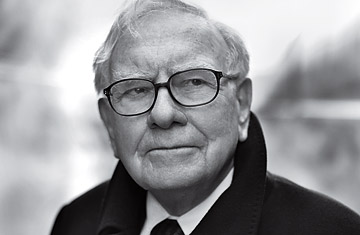
Warren Buffett believes in making money. He believes in fairness. He believes in the ability of government to make people's lives better. But most of all, he believes in luck.
"I've had all this good fortune," Buffett says. "It starts with being born in this country, though. It starts with being born male in 1930."
Genes, luck and birthplace may have helped make Buffett the world's third richest man. But in the past year, his good fortune has also turned him into one of America's most unexpected radicals. He's an ardent capitalist who is demanding higher taxes on the rich and more government spending on the rest to solve our economic problems. Although he is giving away 99% of his $45 billion fortune, he operates less out of a sense of noblesse oblige than noblesse outrage. The country that made him rich is lousy with bailout billionaires, a culture of selfishness and a loss of opportunities. "We can rise to any challenge but not if people feel we're in a plutocracy," he says. "We have to get serious about shared sacrifice."
Shared sacrifice, to Buffett, means not just higher taxes for the rich--who often pay extremely low rates on money made by moving money around--but also curbs on short-termism. He'd like to see speculative-trading gains taxed at much higher rates. He believes CEOs of publicly bailed-out institutions should be on the hook for everything they own if their institutions go bust. He's only half joking when he says he'd like to see private schools banned so that rich families would be forced to invest in the public K--12 system. (No Buffett in Omaha has ever gone to a private school, he notes proudly.) And he's for a complete overhaul of health care, which he calls "a tapeworm in America," one that cuts corporate competitiveness far more than taxes do.
It's the opposite of the Darwinian capitalism embraced by many prominent conservatives who believe the market is the only means to distribute the economy's assets. "The market system rewards me outlandishly for what I do," Buffett says, "but that doesn't mean I'm any more deserving of a good life than a teacher or a doctor or someone who fights in Afghanistan."
He doesn't want to stop bond traders from making their billions: "Capitalism has unleashed more human potential than any other system in history." But, he says, "we need a tax system that essentially takes very good care of the people who just really aren't as well adapted to the market system but are nevertheless doing useful things in society." Bond traders and corporate raiders of the world, take note: your higher taxes should subsidize bridge builders and child-care workers.
In Washington, where economic theory is now a partisan grudge match, the prospect of higher taxes and income redistribution enrages Republicans and their business and banking allies. Republican Mitch McConnell said last September that if Buffett felt guilty, he should just "send in a check." Republicans subsequently proposed a rule that would make it easier for millionaires--and McConnell is one--to voluntarily pay more taxes.
